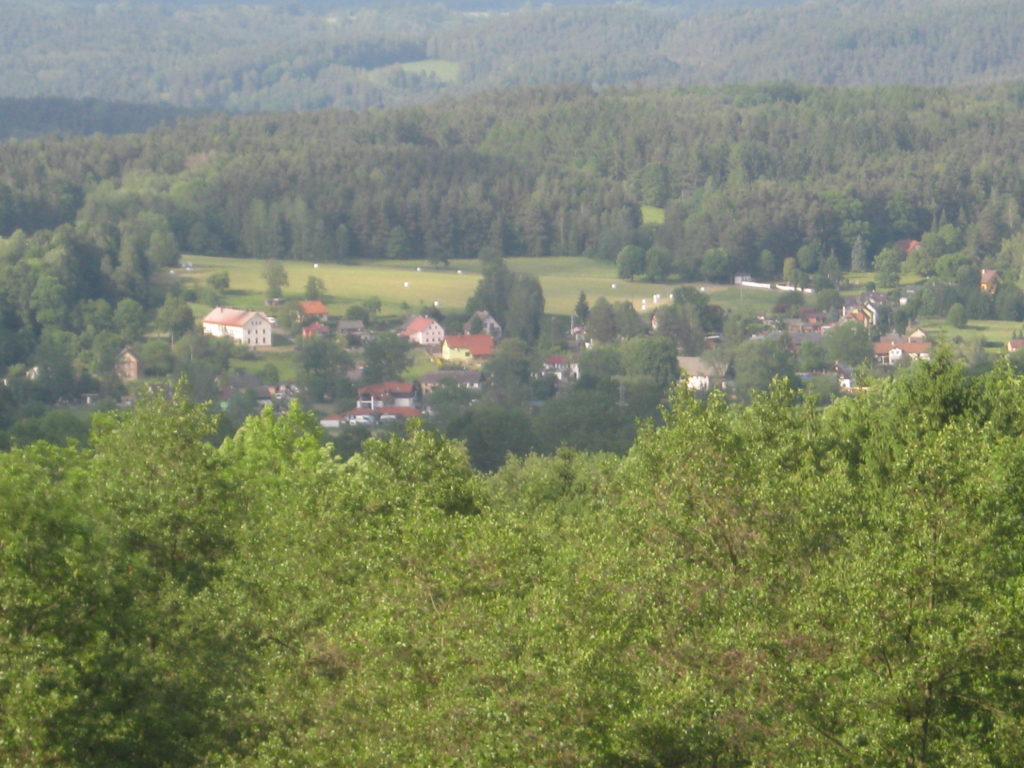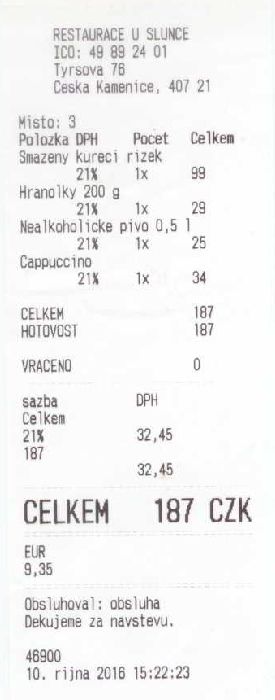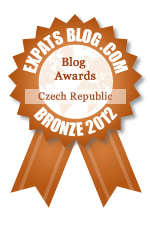
Stará Oleška from the hills above Huntírov © Ricky Yates
There are two questions I am regularly asked in comments on this blog, by email, or on Facebook. One is, ‘Are there many English-speakers where you’re now living?’ The other is, ‘Does the area get many visitors?’ This post is my attempt to answer both these questions.
Stará Oleška has had many visitors over the five months I’ve now lived here. This is because the village is home to three camping & caravan sites – Autokempink Ceská Brána, Autokemp Aljaška and Camp Pod lesem; and two pensions – Pension Vyhlídka and Penzion Rosalka. Many of those who come are Czech, from right across the country. But there are also many foreign visitors, most notably Germans, together with Dutch, Flemish-speaking Belgians and Danes.
Why do Germans visit? There are numerous reasons.
Proximity – In a straight line, Stará Oleška is little more than ten kilometres from the Czech-German border. However, you cannot drive or walk there in a straight line because of the hills and mountains in-between. Instead, it takes about half-an-hour to drive from the Schmilka-Hrensko border crossing that lies alongside the point where the Elbe becomes the Labe. And plenty of Germans from nearby Pirna, Dresden and Meissen do come, judging by the registration plates of vehicles passing through the village, along with those from major centres slightly further afield such as Leipzig and Chemnitz.
Price – Petrol, cigarettes, beer and eating out are all cheaper than in Germany. Some Germans cross the border just to fill up and buy supplies. But it does mean that a weekend, long weekend or week’s visit can be had at a considerable lower cost than if spent in Germany.
Heimat – A word that is almost impossible to fully translate into English! The usual translation is ‘homeland’, but it has a far deeper meaning. For many Germans, travelling to the Böhmische Schweiz/Bohemian Switzerland is revisiting the Heimat.
Therefore if local Czech people have a second language it is almost always German. Menus in Bar-Restaurants are in Czech and German. Staff working in these establishments have to have at least basic German as visiting Germans usually don’t speak a word of Czech, beyond knowing that ‘beer’, (or Bier 🙂 ), is ‘pivo‘.
With regard to language, most visiting Germans also have the annoying habit of greeting people on entering a restaurant, or meeting fellow walkers on waymarked footpaths, with either ‘Guten Tag‘ or ‘Hallo‘, with absolutely no recognition that they are no longer in Germany. I always reply very firmly with ‘Dobrý den‘, sometimes following it up with, ‘Wir sind in der Tschechischen Republik, nicht in Deutschland‘. The reactions are interesting 🙂
The other typical German assumption is not to bother to exchange currency, believing that they can always pay in Euro, rather than in Czech crowns. Most hotels, restaurants and many shops are happy for them to do so. But sometimes German laziness can be costly.
Bar-Restaurace U Soni was using an exchange rate of CZK 24.00 to EUR 1.00 over the summer. The current official exchange rate is around CZK 25.50 to EUR 1.00 so I think they were being perfectly fair as they will be charged by their Czech bankers, for banking foreign currency. I know, as each time the Frauenkirche in Dresden reimburse me for my travel expenses, I lose CZK 100 for the privilege of having Euro paid into my Czech bank account 🙁

Rip-off exchange rate 🙁
But when exploring this area a year ago, I had lunch in a bar-restaurant in nearby Ceská Kamenice. This is the scan of my bill. The Euro price at the bottom has been calculated at an exchange rate of CZK 20.00 to EUR 1.00. At that time, the correct exchange rate was nearly CZK 27.00 to EUR 1.00!
One final story about visiting Germans and currency. On Saturday 23rd September, I attended a most enjoyable classical concert in Kostel sv Václava, Srbská Kamenice. The entrance fee was a very modest CZK 100. The male half of an older German couple immediately in front of me at the Church door, produced a fifty Euro note from his wallet & expected change!!!!!!
What about visiting Dutch, Flemish-speaking Belgians and Danes? Why do they come?
My usual answer to this question is because they have no hills or mountains in their own countries 🙂 Actually, the Flemish-speaking Belgians do; but they would have to travel to Wallonia and speak French 🙁
All three nationalities love caravanning and camping and so the facilities here are perfect for their needs. And for all of them, it only takes one long day’s drive to get here.
As with the Germans, the other important factor is price. Nearly everything is cheaper here than in their home countries. For a Dane, used to paying around DKK 45.00, (over CZK 150.00), for 0.5l of beer, being charged CZK 22.00 in Bar-Restaurace U Soni for the same quantity of liquid refreshment, is like being in heaven 😀
But then comes the question of language. Because very few people, other than their fellow citizens, speak their native tongue, Dutch, Flemish-speaking Belgians and Danes recognise that to communicate when outside of their home countries, they need to speak another language. And for nearly all of them, it is second language English. But that is where they sometimes come unstuck as very few people here speak English!
Several times this past summer, when sitting on the terrace at Bar-Restaurace U Soni, I have heard Dutch/Flemish/Danish people say in English, what they want to drink. In Prague, that would be fine, but not in the Böhmische Schweiz/Bohemian Switzerland. Other than ‘beer’, because it sounds the same as ‘Bier‘ in German, they are not understood. Instead, they have to resort to third, or even fourth language German, bearing in mind that Flemish Belgians and many Dutch people, are often also fluent in French.
Several times this past summer, I have been quite proud of myself by helping convert second language English, into my best bar-restaurant Czech, in order to help Dutch/Flemish/Danish visitors to obtain what they want.
So to further answer the first question at the beginning of this post, there are very few English speakers living in this part of the Czech Republic. I have now met a small number when doing business in Decín, usually people who have spent time working or studying in the UK or the USA. But because very few native English-speakers visit this area, people who speak fluent English are very few and far between.



I must admit I would have never have thought of visiting this part of Europe – I had no idea you are that close to the German border! Sounds like I better brush up on my Czech – can’t be any harder than Chinese! RS
Hi Lis – You are not alone as an English-speaker, in not thinking of visiting this part of the world. English-speakers visit Prague & Dresden, but not this beautiful area in-between. Yes – Germany is very close by. It is 45 minutes on the train from Decín to Dresden – one of the reasons I settled here.
The one advantage that Czech has over Chinese is that it uses the Latin alphabet, but with a variety of diacritics.
I have to embarrassingly admit that the Germans you describe visiting your village remind me a lot of Americans going to Canada, Mexico, or pretty much anywhere else 😀
And “wow!” at your response to the Germans greeting you in German! You are quite brave! (but then again, I hear Germans are often blunt so maybe fighting fire with fire?) I’m just happy to practice some German so I play along, but obviously, I completely understand your point!
It is really amazing at the English I hear in CB nowadays vs. almost five years ago… this city is becoming more international by the year, it seems.
Hi Cynthia – Don’t get too embarrassed. Many Brits are equally as bad when on holiday in Spain, France or Greece. Immediately speaking in English and repeating what they originally said in a louder voice, if they don’t get a response first time 🙁
A lot of the time I just stick with a firm, ‘Dobrý den‘. But particularly with walkers, when reminding them that they are no longer in Germany, I do go on and point out in my bad German 🙂 that I am neither German or Czech & that when I go walking in Germany, I would never greet people with ‘Good Morning’ or ‘Good Afternoon’, but with ‘Guten Tag’.
Very interesting to know that you’ve noticed an increase in the use of English during your five years in CB. I shall be listening carefully during the coming years to see if I have a similar experience here 😉